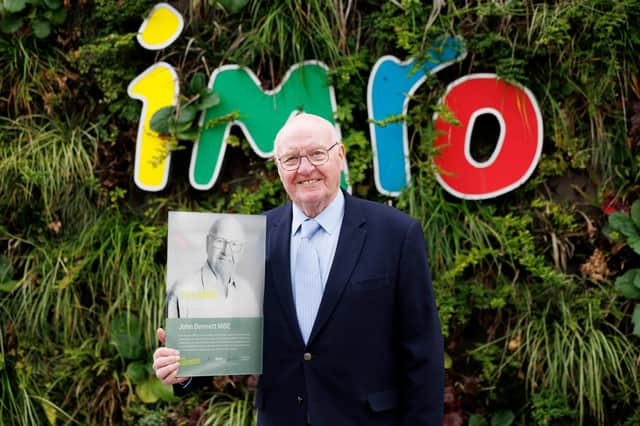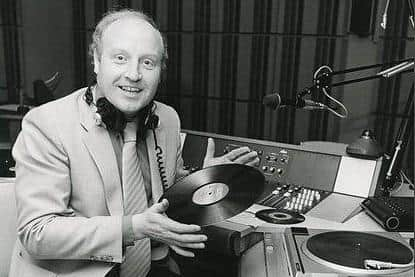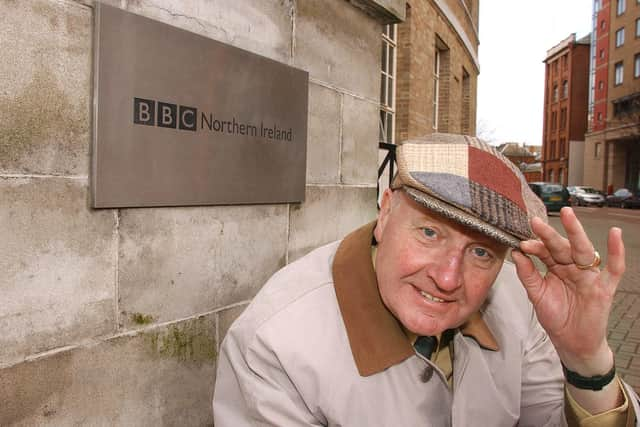Big Interview with veteran BBC NI television radio broadcaster John Bennett


At 81 years young, John is still delighting audiences with his easy listening Saturday Club and Sunday Club shows, with music, mystery voices, yarns and listener requests.
If you want to give Ant and Dec (more of them later) a miss on the TV, then there’s nothing more sleep-inducing than turning on the transistor and snuggling under the duvet with John (figuratively speaking, of course) and his soporific voice.
Advertisement
Hide AdAdvertisement
Hide Ad“You make me sound like an anaesthetic,” he laughs, adding, “there’s a lovely sense of communion about joining in a programme, not just my programme, but any programme that’s providing reasonably soporific music at that time on a Saturday or Sunday night. You get this feeling of being part of a bigger thing – there’s always the knowledge that you’re not the only one listening to it, you may be on your own, but there’s an awful lot of people listening and they may be on their own, but they might be in the next street to you or they might be in the USA.”


As ‘president’ of the club, John invites listeners for some late-night music designed to soothe away the problems of the week and ease them gently into a peaceful sleep.
"It may be a form of escapism for listeners, but it’s escapism for me too. I can lose myself just as much as the listener can. Sometimes I have to pull myself together and remember I’m live and not to be getting too cosy, because I could fall off and go to sleep!”
Born and bred in east Belfast, where he still lives, John Bennett is a much cherished and revered broadcaster, who has presented music, entertainment, sports and current affairs programmes for close to six decades.
Advertisement
Hide AdAdvertisement
Hide AdHis celebrity interview series With Bennett has taken him into scores of starry living rooms and hotel foyers – from Janet Street-Porter to Jasper Carrot – and his special Christmas morning programme, Calling Home, has connected families at home and abroad for several decades.


Asked if there is anyone he would liked to have interviewed, but didn’t, he’s quick to reply – ‘Peter Sellers’.
“The Goons were comedy gods in the 1950s and 60s. I was lucky enough to interview Harry Seacombe and Spike Milligan, but I never did get Peter Sellers, he gave very few interviews.
"Spike was wonderful. He’s a hero of mine, so I was a bit in awe of him. He had the reputation of being very short with journalists and interviewers, but I got him on a day on which he was at peace with the world and I stayed for most of the afternoon in his house down on the south coast of England and we talked about everything from cricket to literature.”
Advertisement
Hide AdAdvertisement
Hide AdHaving spent almost six decades in the industry, John is a repository of stories and anecdotes, so would he ever tempted to write his memoirs?

“Nah, I couldn’t be bothered. That would be too much like work,” he laughs.
But reflecting on his career, one senses the immense joy he had derived from a much-loved and varied job.
“I was lucky enough to do four Eurovision contests. I visited a lot of places I wouldn’t normally have, like chasing Santa Claus to Lapland, climbing mountains in the middle of the night in Germany with the Territorial Army, playing golf at midnight in the Shetland Islands – that was an experience!
Advertisement
Hide AdAdvertisement
Hide Ad“I also got to interview Tony Bennett a couple of times and Glen Campbell and Maureen O’Hara. I went down to her home in West Cork. I went over to Majorca and met Jeffrey Archer in his mansion on the cliff where he wrote all his blockbuster novels.”
John is also, of course, known for presenting BBC Radio Ulster's morning show from 1993 until 2003 and the arrival of a much different style of presenter – Stephen Nolan.
One of three children, John can remember his father, who worked in the shipyard, calling the radio ‘the set’ or ‘the wireless set’
“It was always in the corner of the room and people sat round the set, even though there was nothing to see. I remember as a child looking at it and wondering how they got all those people in behind that little net where the speaker was. I think it still has that magical attraction for older people."
Advertisement
Hide AdAdvertisement
Hide AdHow John, who had worked as a primary school teacher for 23 years, became one of those people ‘behind that little net’ is a story of serendipity.
"I actually started in 1964 in Ulster Television. I was a folk singer back in those days and I did a folk series on UTV. The following January, 1965, I started with the BBC as a singer and guitarist. As often happens in this business, a complete chance meeting sent me off on a completely different direction. The football commentator, Ronald Rosser, had been taken ill a few days before the cup final and head of sport in BBC heard that I played a bit of football in my youth (he once played for Glentoran)
and asked could I commentate on the match. Being young, I said ‘Of course I can’. So, I commentated on the match and then after that the music started to take a backseat and I became a sports reporter and commentator on television for 25 years.”
He loved commentating describing it as a “very exciting, but exacting job.”
Advertisement
Hide AdAdvertisement
Hide Ad"When you think about what’s involved in commentating on a live football match, there’s 22 players and a referee and a number of players on the bench and they’re moving all over the place and you have to paint the picture of what’s happening. You have to make instant decisions about what you are going to say about something. You don’t get a chance to get it wrong, because once it’s said, it’s out.”
And, of course, working during the troubles, brought many practical difficulties to the job.
“I would have been out covering a football match to come back and find a bomb scare had cleared the building. I remember sitting on the kerb outside Broadcasting House trying to write up notes with a secretary who had managed to get a typewriter out.
“On other occasions when there were bomb scares they would usher us down to what was then the orchestra studio on the ground floor, because it had big thick soundproof walls. Then there was the infamous occasion when they actually blew up Broadcasting House. It was an interesting period, but a period I wouldn’t like to go through again.”
Advertisement
Hide AdAdvertisement
Hide AdSadly, John’s wife Joan died three years ago, after 53 years of marriage.
"I have a son and a daughter and they look after me. They are very attentive and supportive. I have two wonderful grandchildren and they keep me young. I couldn’t ask for anything better than that.”
His family will accompany him to London next month to receive his MBE, which he was awarded in the New Year’s Honours list for services to television and radio broadcasting.
“It was totally out of the blue. To be honest I thought it was some of the lads having a bit of a laugh. But, I am looking forward to it. I still don’t know who is going to do the presentation. It might be His majesty. It might be Ant and Dec for all I know!
Advertisement
Hide AdAdvertisement
Hide AdOutside of work, John enjoys gardening, describes himself as a ‘crossword fiend’ and loves calligraphy, but what he loves most is being behind the mic.
"I really am very aware of the fact that I am very lucky to do the job. It is a privilege to be able to talk to people when they are in their own homes or wherever they are.
“I’ll keep doing it until they come and pull the plug out and say ‘that’s it, good night’, but I’ve no intention of stopping.”